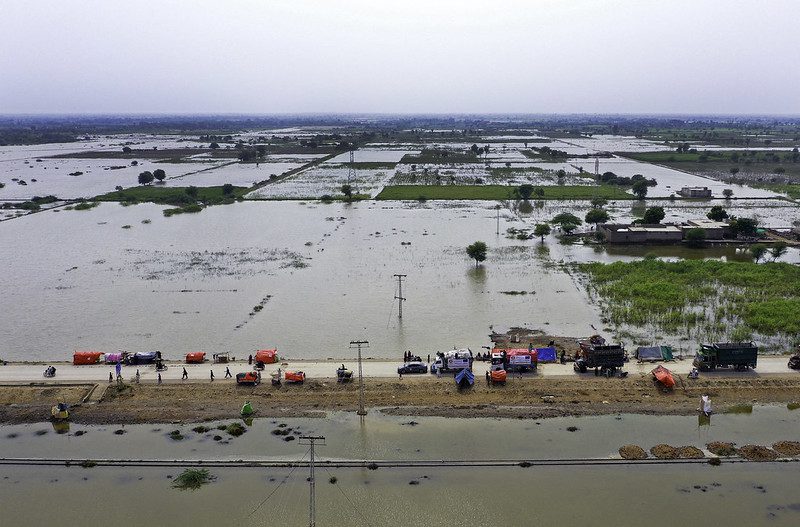The following is an excerpt of an article that was originally published on Asia Times.
Click here to read the full article.
As Pakistan drowns, as Puerto Rico is cast into darkness, and as Jacksonians remain thirsty, it’s past time for a climate tax on fossil fuel companies.
By Sonali Kolhatkar
What do Pakistan, Puerto Rico, and Jackson, Mississippi, have in common? They’ve all recently experienced climate-related catastrophic rains and flooding, resulting in the loss of homes, electricity, and running water. But, even more importantly, they are all low-income regions inhabited by people of color—the prime victims of climate injustice. They face inaction from negligent governments and struggle to survive as fossil fuel companies reap massive profits—a status quo that United Nations Secretary-General António Guterres has called a “moral and economic madness.”
Pakistan, which relies on yearly monsoons to enrich its agricultural industry, has had unprecedented floods since June, impacting 30 million people and killing more than 1,500—a third of them children.
Zulfiqar Kunbhar, a Karachi-based journalist with expertise in climate coverage, explains that “things are very critical” in the rain-affected areas of his nation. Kunbhar has been visiting impacted regions and has seen firsthand the massive “agricultural loss and livelihood loss” among Pakistan’s farming communities.
Sindh, a low-lying province of Pakistan, is not only one of the most populous in the nation (Sindh is home to about 47 million people), but it also produces about a third of the agricultural produce, according to Kunbhar. Twenty years ago, Sindh was stricken with extreme drought. In the summer of 2022, it was drowning in chest-deep water.
The UN is warning that the water could take months to recede and that this poses serious health risks, as deadly diseases like cerebral malaria are emerging. Kunbhar summarizes that provinces like Sindh are facing both “the curse of nature” and government “mismanagement.”
Climate change plus government inaction on mitigation and resilience equals deadly consequences for the poor. This same equation plagues Puerto Rico, long relegated to the status of a United States territory. In September 2022, on the fifth anniversary of Hurricane Maria, which devastated Puerto Rico in 2017 and killed nearly 3,000 people, another storm named Fiona knocked out power for the entire region.
Read more at Asia Times.
Sonali Kolhatkar is an award-winning multimedia journalist. She is the founder, host, and executive producer of “Rising Up With Sonali,” a weekly television and radio show that airs on Free Speech TV and Pacifica stations. Her forthcoming book is Rising Up: The Power of Narrative in Pursuing Racial Justice (City Lights Books, 2023). She is a writing fellow for the Economy for All project at the Independent Media Institute and the racial justice and civil liberties editor at Yes! Magazine. She serves as the co-director of the nonprofit solidarity organization the Afghan Women’s Mission and is a co-author of Bleeding Afghanistan. She also sits on the board of directors of Justice Action Center, an immigrant rights organization.
